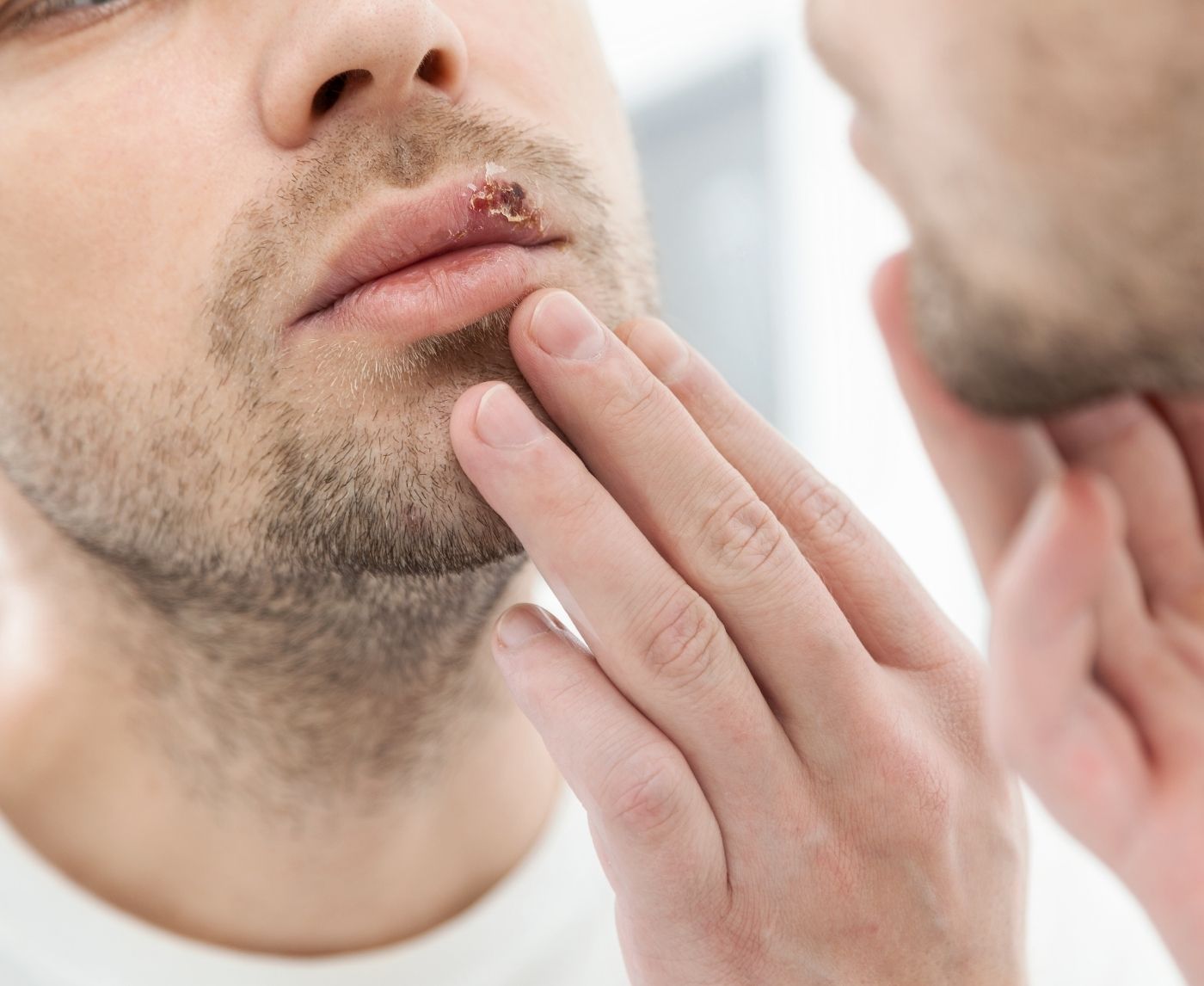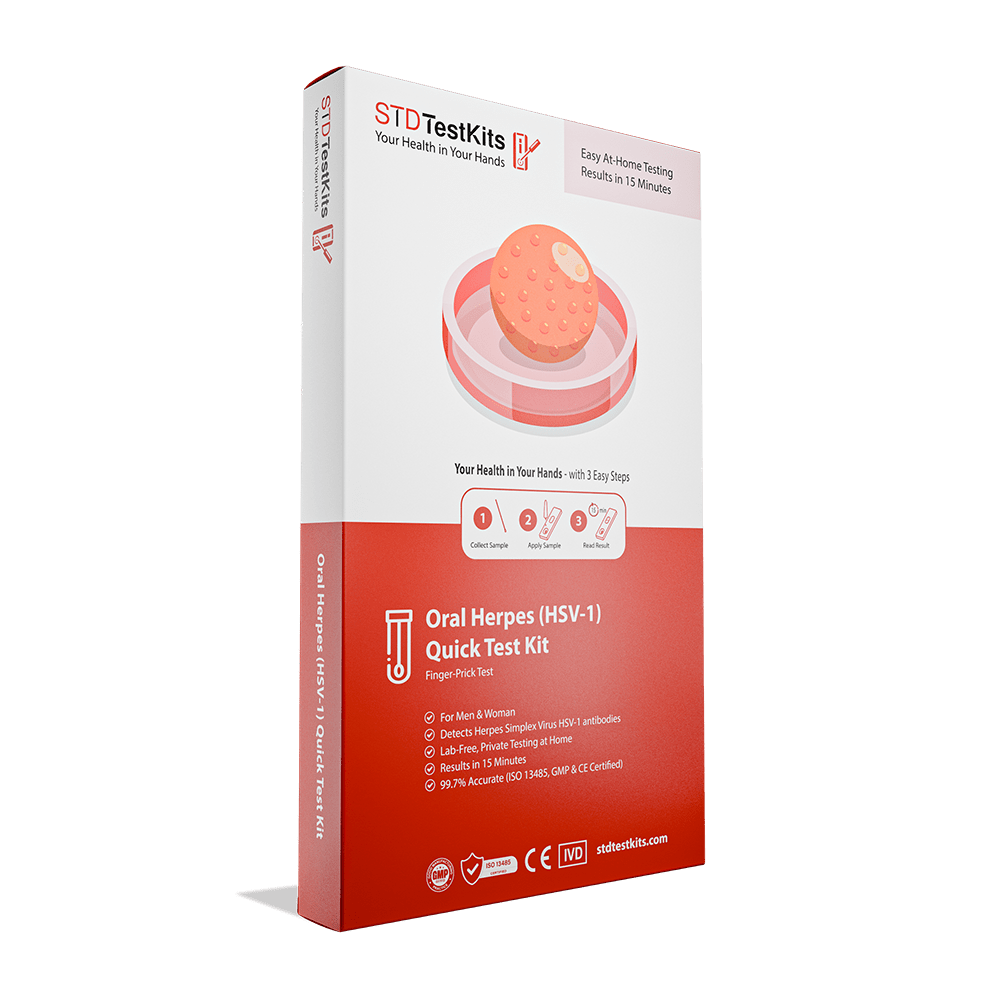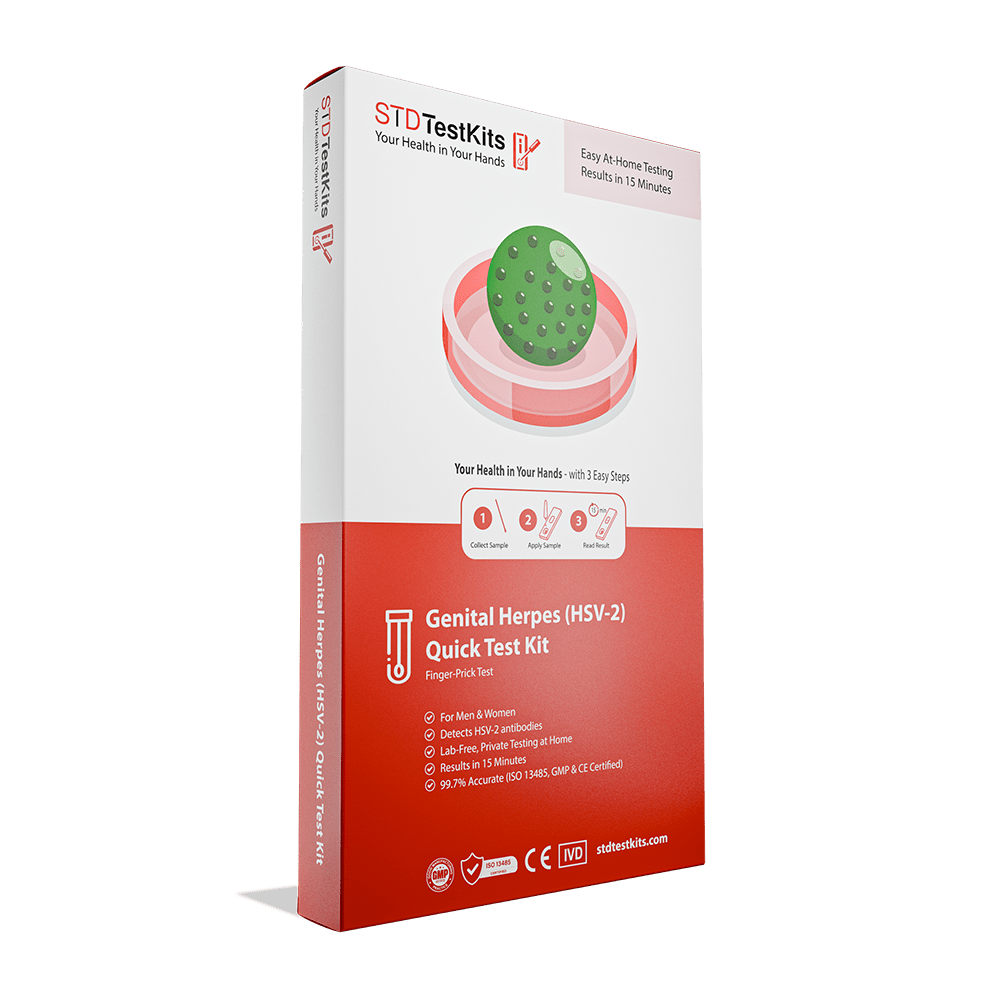Polyamory and STDs: Are You Really at Higher Risk?
Quick Answer: Genital herpes can be caused by either HSV-1 or HSV-2, while oral herpes is usually HSV-1, but both can appear in either location. Testing is the only way to know for sure.
When the Symptoms Don't Make Sense
Let’s start with where most herpes panic begins: a sore that shows up out of nowhere. For some people, it’s an angry cluster of blisters near the genitals that burns like hell when they pee. For others, it’s a single red bump that could pass for a shaving nick. And sometimes? There’s nothing at all, just a feeling. Tingling. A slight itch. A weird fatigue that doesn’t match the week.
Take Ty, a 24-year-old grad student, who messaged his ex after spotting a sore near his lip.
“I assumed it was a cold sore, because I get them when I’m stressed,” he said. “But then I remembered we had oral sex, both ways, and I started freaking out that I gave her genital herpes.”
Now flip that. Dani, 32, found a few painful blisters near her vulva after a weekend trip with a new partner. “I thought HSV-2 was the ‘downstairs’ herpes and HSV-1 was just for cold sores,” she said. “But when I finally tested, I had HSV-1, genitally.”
What most people don’t realize is that both types of herpes can infect both the mouth and the genitals. The virus doesn’t follow your mental map. It follows skin contact, and it doesn’t care whether the encounter was “real sex,” protected, or even just brief oral. That’s why symptoms alone often don’t tell the whole story.
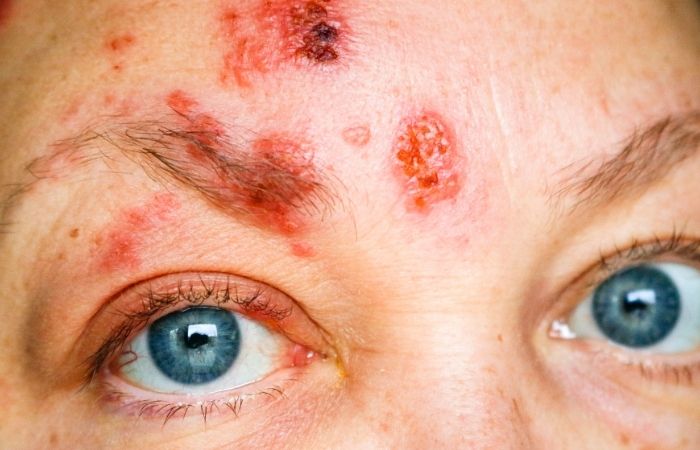
People are also reading: How Partner Notification Prevents Repeat STD Infections
HSV-1 vs HSV-2: Why the Old Labels Don’t Hold Up
Historically, HSV-1 has been known as the virus behind cold sores, while HSV-2 was pegged as the genital herpes culprit. But in the past two decades, thanks to changing sexual behaviors, especially the rise of oral sex as a first or “safer” experience, that divide has blurred dramatically.
According to the CDC, over 50% of new genital herpes infections are now caused by HSV-1. That means someone can test positive for HSV-1 after a genital outbreak and have never had a cold sore in their life. It also means that someone with genital HSV-1 is less likely to experience recurrent outbreaks compared to someone with HSV-2, but they’re still capable of passing it on, even without visible symptoms.
And that’s the other twist: herpes can be spread through asymptomatic shedding, especially in the days leading up to or after an outbreak. You might feel totally fine, no sign of a sore anywhere, and still be contagious.
So the key isn’t just which type you have, it’s where it shows up, how often it recurs, and how you handle testing and protection going forward. The virus plays the long game, and if you’re going to live with it (which, frankly, millions do without issue), it helps to understand its rules.
Table 1. Comparing HSV-1 and HSV-2 by location, transmission, and shedding risk.
Can You Tell by the Look? Not Always.
If you’ve been frantically comparing Google Images to what’s happening on your skin, don’t. Herpes outbreaks can vary wildly not just between people, but between episodes in the same person. Some look like a classic crop of blisters. Others mimic ingrown hairs, eczema, or even hemorrhoids.
In early infections, the first outbreak is usually the most intense. You might get flu-like symptoms, swollen lymph nodes, and painful sores. But after that? You might never have another visible outbreak, or you might get one every few months, depending on your immune system, stress levels, and how your body handles the virus.
There’s also the issue of timing. A sore might show up days or even weeks after exposure. So if you're trying to connect a sore to a specific hookup or moment, that detective work can mislead you. The only way to know for sure? Get tested, not just for herpes in general, but by type-specific serology or PCR if you’re symptomatic.
Testing for Herpes: Why It’s Not Always Straightforward
By the time Nina, 28, made it into a clinic, her symptoms had already faded. She told the nurse she’d had a sore near her anus a week ago, along with tingling and fatigue. “They said there was nothing to swab now and they didn’t recommend blood testing unless I had another outbreak,” she said. “I left with zero answers. Still no idea if it was herpes or just a hemorrhoid.”
Unfortunately, that kind of limbo isn’t rare. Unlike other STDs like chlamydia or gonorrhea, herpes isn’t always part of a routine STD panel. And because the virus lives in nerve cells, not just in bodily fluids, you can’t always “catch it” in the act. This means testing depends heavily on timing, symptoms, and test type.
If a visible sore is present, a healthcare provider can swab the lesion and run a PCR test, which looks for herpes DNA. This is considered the gold standard for diagnosing an active outbreak, and it can tell you the type: HSV-1 or HSV-2. But if you show up after the sore has healed or if no sore is visible? You may be offered an IgG blood test, which checks for antibodies. These usually show up 4–12 weeks after exposure, which means early tests might come back negative even if you’re infected.
And then there’s the issue of false positives and negatives, especially with the widely used IgG test. It’s better than nothing, but it’s not perfect. Many people get “equivocal” results that fall in a gray zone. Others test positive without ever having symptoms. If this sounds confusing, that’s because it is. But there are ways to navigate it.
Table 2. Testing methods for herpes and when to use each one.
The Misdiagnosis Trap: It’s Not Always “Just a Skin Thing”
Imagine you get a bump after shaving. It hurts a bit, but looks like an ingrown hair. You treat it with warm compresses. It goes away. Weeks later, something similar happens again, but this time you feel weird all over: low energy, low-grade fever, weird aches. You go to urgent care. They say it’s irritation or a yeast infection. No one suggests herpes. That’s the reality for many people.
In fact, research shows that as many as 80% of people with genital herpes don’t know they have it. Either they’re asymptomatic, or they chalk their symptoms up to something else: friction, eczema, allergies, stress. Even doctors sometimes miss it, especially if the patient isn’t experiencing classic textbook blisters.
This is part of why herpes spreads so easily: it hides in plain sight. People who carry HSV-1 or HSV-2 can shed the virus even without a sore, and most transmission happens during periods when there are no visible signs. That’s why it’s not enough to “only hook up when nothing’s visible.”
For Jordan, a 35-year-old nurse, it took three different doctors to get answers.
“The first told me it was a fungal infection. The second suggested an allergic reaction. The third finally did a swab and confirmed HSV-2. I was furious, not just about the virus, but about the runaround.”
If you suspect herpes, push for PCR testing if symptoms are present. If not, wait at least 12 weeks post-exposure before doing an antibody test, and make sure it’s type-specific IgG, not IgM (which is unreliable and not recommended by experts). And remember: no test is perfect. If results don’t match your symptoms, you may need to retest later.
What About At-Home Herpes Tests?
Testing from home can feel like a lifeline, especially if you’re dealing with shame, lack of insurance, or fear of being judged in a clinic setting. At-home herpes tests usually rely on finger-prick blood samples to check for antibodies (IgG). These tests are best used after the 12-week mark post-exposure, to allow time for your immune system to generate detectable antibodies.
That means if you had unprotected oral or genital sex last weekend, testing today might give you a false sense of security. You need to wait. But once that window has passed, an FDA-approved at-home test can provide private, lab-grade answers without ever leaving your room.
One caveat: if you’re having active symptoms, a sore, a new outbreak, then a mail-in blood test might miss what a swab could catch. In that case, it’s worth getting in-person care, even if it feels scary. Some clinics offer anonymous or walk-in STI services. Many telehealth providers can help guide you on what test to order and when.
If you’re in the window where a test will be accurate and you want privacy, this herpes rapid test kit can give you answers quickly and discreetly, no appointments, no waiting rooms.
Because the truth is, knowing helps. Even if the result is positive. Especially then.
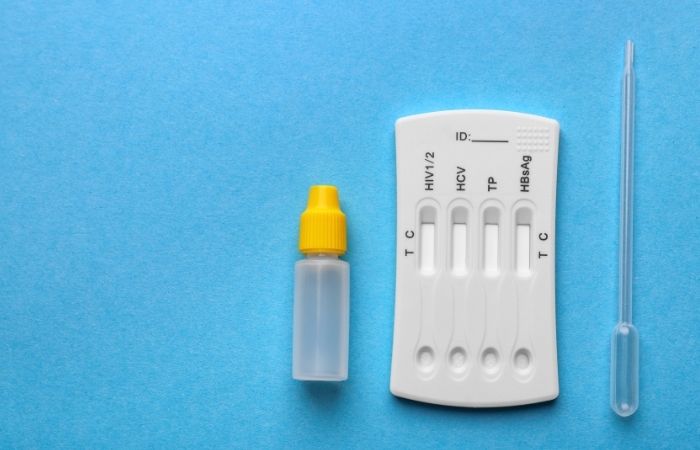
People are also looking for: Can Gonorrhea Make a Man Infertile?
“I Have Herpes”: What That Diagnosis Feels Like
Alejandro sat in his car outside the pharmacy, staring at the paper bag in his hand. Inside were antiviral pills and a one-page handout labeled “Herpes Simplex Virus.” He hadn’t told anyone yet. The diagnosis felt like a bomb no one else could see.
“I thought no one would want to sleep with me again,” he admitted. “I thought I was ruined.”
This is the part no one tells you: it’s not just the virus that hurts. It’s the story you suddenly start telling yourself. That you’re dirty. That you’re dangerous. That you’re the exception to everyone else’s freedom. And yet, statistically, you’re not. You’re actually very normal.
According to the CDC, about 1 in 6 Americans aged 14 to 49 has genital herpes, and more than half the global population under 50 carries HSV-1, most often acquired in childhood. This isn’t rare. It’s not niche. It’s not a punchline. It’s part of being human in a world where skin touches skin, where mouths explore bodies, where mistakes happen, and where shame doesn’t belong.
That doesn’t mean it’s easy. The first few weeks after a diagnosis can feel like a fog: anxiety about disclosure, uncertainty about symptoms, panic about infecting someone else. But over time, and especially with accurate information, that fear often gives way to clarity, agency, and peace.
The Psychological Gap: What You Fear vs What’s Real
Part of why herpes hits so hard emotionally is that most of us were never taught to separate a diagnosis from an identity. It’s not just “I have a virus.” It becomes “I am unsafe. I am unworthy.” That script runs deep, especially for women, queer folks, and anyone already marginalized by sexual stigma.
But when you zoom out, when you look at how people actually live after diagnosis, a very different picture emerges. Partners still stay. Sex still happens. People learn their patterns, get medication if needed, and move on. In fact, many people say their herpes diagnosis made them better communicators, more mindful lovers, and less likely to tolerate risky or disrespectful relationships.
Table 3. Emotional impact versus lived experience after a herpes diagnosis.
These aren’t just feel-good platitudes, they’re backed by data. A 2020 study in the journal Sexually Transmitted Infections found that while emotional distress was common immediately after diagnosis, most participants reported improved psychological outcomes within six months, especially when they had access to education, peer stories, and respectful care.
What About Transmission, Will I Always Be a Risk?
Here’s the real talk: herpes doesn’t go away, but the risk it carries can be managed extremely well. Most people with HSV-1 or HSV-2 don’t transmit it to their partners. That’s because suppression therapy (daily antivirals) combined with open communication and barrier protection significantly reduces the chance of transmission, especially in discordant couples (when one person has herpes and the other doesn’t).
For example, if you have genital HSV-2 and take daily valacyclovir, your chances of transmitting the virus to a long-term partner during vaginal sex are reduced by about 48%, and condoms add another 30% reduction, according to JAMA research.
In other words, the biggest risk isn’t the virus, it’s misinformation. Plenty of people have had multiple partners, years of healthy sex, and zero transmissions. It’s not about being perfect. It’s about being informed.
How Do I Tell Someone I Have Herpes?
Few things make people sweat like the idea of a herpes disclosure. But the truth? It gets easier. And most rejections don’t come from herpes, they come from how the conversation is framed. When you’re calm, informed, and confident in how you manage your status, that energy translates.
Try something like this: “I want to share something with you before we get physical. I have genital herpes. It’s something I manage well with medication, and I haven’t had symptoms in a long time. I always use protection and can walk you through any questions you have. I trust you’ll let me know how you feel.”
Most people won’t ghost you. Many will say thank you. A few might ask questions. And if someone walks away? That doesn’t make you undesirable, it makes them not ready.
If you need time before dating again, that’s valid. If you want to be upfront on dating apps, go for it. If you’d rather build connection first, that’s fine too. You get to decide when and how you tell your story. The virus may be permanent, but the shame isn’t.
And if you're still sitting in that post-diagnosis fog wondering if your life just got smaller, know this: for most people, it eventually gets bigger. More honest. More real. More free.
FAQs
1. I just got a bump, how do I know if it’s herpes or not?
Honestly? You don’t, at least not by eyeballing it. Herpes can look like a pimple, a cut, a razor bump, or nothing at all. The only way to know for sure is to test. If there’s a sore, ask for a PCR swab. If it’s healed, wait 12 weeks and do an IgG blood test. And don’t panic, half the time it’s something else entirely.
2. Is HSV-1 just “mouth herpes” and HSV-2 only “down there”?
Not anymore. That old rule is officially dead. Thanks to oral sex (and let’s be honest, most of us have had it), HSV-1 can totally cause genital herpes. HSV-2 is usually genital, but even that can show up in the mouth. The virus goes where there’s skin contact, labels don’t matter to it.
3. Can I get herpes even if my partner had no visible sores?
Yes, and this is the herpes twist most people miss. The virus can be passed even when there’s no outbreak. It’s called asymptomatic shedding, and it’s sneaky. That’s why it’s so common to “not know” who gave it to you, or when.
4. What does a first herpes outbreak feel like?
Think flu + sunburn in your underwear. For some people, it’s a cluster of painful blisters. For others, it’s a weird tingling, burning when you pee, or nothing at all. The first time is usually the worst. After that, many people have no symptoms, or don’t notice them.
5. Does having herpes mean I’ll break out forever?
Nope. Many people only get one outbreak ever. Others get them rarely, like once a year, triggered by stress or illness. Suppressive meds like valacyclovir can lower the number and severity of outbreaks. It’s manageable, and it usually gets better with time.
6. Can I still hook up if I have herpes?
Absolutely. It just means being upfront and taking precautions. Condoms help. Suppression meds help. Honesty helps the most. Most people are way less freaked out than you expect, especially if you’re calm and informed about it.
7. What if someone ghosts me after I tell them?
Then they’re not your person. And that’s okay. Rejection sucks, but herpes is a great bullshit filter. If someone can’t handle a common skin-to-skin virus, they probably can’t handle real intimacy either. Your people are still out there.
8. Can I test myself at home for herpes?
Yes, but timing matters. At-home tests are usually blood-based and best taken 12+ weeks after exposure. If you’re symptomatic right now, go to a clinic for a swab test, it’s faster and more accurate. But for peace of mind in the privacy of your room? At-home options work.
9. Should I tell every past partner I might have exposed them?
Not always. If you’ve had herpes for a while and only just found out, it’s likely impossible to trace. Focus on future transparency. But if someone you were recently with might have been exposed, a heads-up is the decent move. You can do it anonymously if needed.
10. Will herpes affect pregnancy or my ability to have kids?
Herpes doesn’t affect your fertility. If you’re pregnant, doctors may monitor you more closely, especially if you have genital outbreaks near delivery. With good care, you can have a healthy pregnancy and baby. Millions do.
What Now? Here’s What Doesn’t Change
If you’ve made it this far, you probably came here scared. Maybe angry. Maybe convinced your sex life was over or that no one would ever touch you again. But here’s the truth: herpes doesn’t make you less lovable, less sexy, or less deserving of safety and pleasure. It just means your body has a very common virus, one that the majority of people carry by midlife, whether they know it or not.
Your next steps depend on where you are. If you haven’t tested yet, now’s the time. If you have symptoms, swab testing is best. If you’re past the window and need privacy, an at-home combo test can give you answers discreetly. And if you already know your status? Start learning your patterns, talk to your partner, and remember that management is possible, and so is peace.
You deserve facts, not fear. Care, not judgment. And clarity, not confusion. Whatever brought you here, you’re already doing the right thing.
How We Sourced This Article: We combined current guidance from leading medical organizations with peer-reviewed research and lived-experience reporting to make this guide practical, compassionate, and accurate. In total, around fifteen references informed the writing; below, we’ve highlighted six of the most relevant and reader-friendly sources.
Sources
1. Planned Parenthood – Herpes: What You Need to Know
3. Herpes , STI Treatment Guidelines | CDC
4. Oral Herpes (HSV-1 & HSV-2) | Johns Hopkins Medicine
5. HSV-1 vs HSV-2: Herpes Overview | Johns Hopkins Medicine
6. Herpes: Symptoms, Causes, and Treatment | Medical News Today
About the Author
Dr. F. David, MD is a board-certified infectious disease specialist focused on STI prevention, diagnosis, and treatment. He blends clinical precision with a no-nonsense, sex-positive approach and is committed to expanding access for readers in both urban and off-grid settings.
Reviewed by: S. Li, PA-C | Last medically reviewed: September 2025
This article is for informational purposes and does not replace medical advice.




